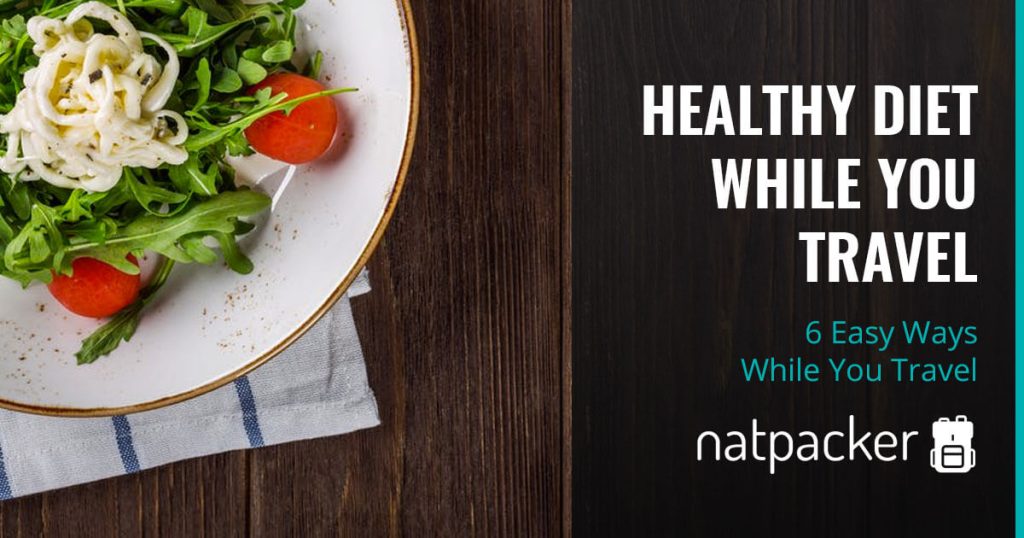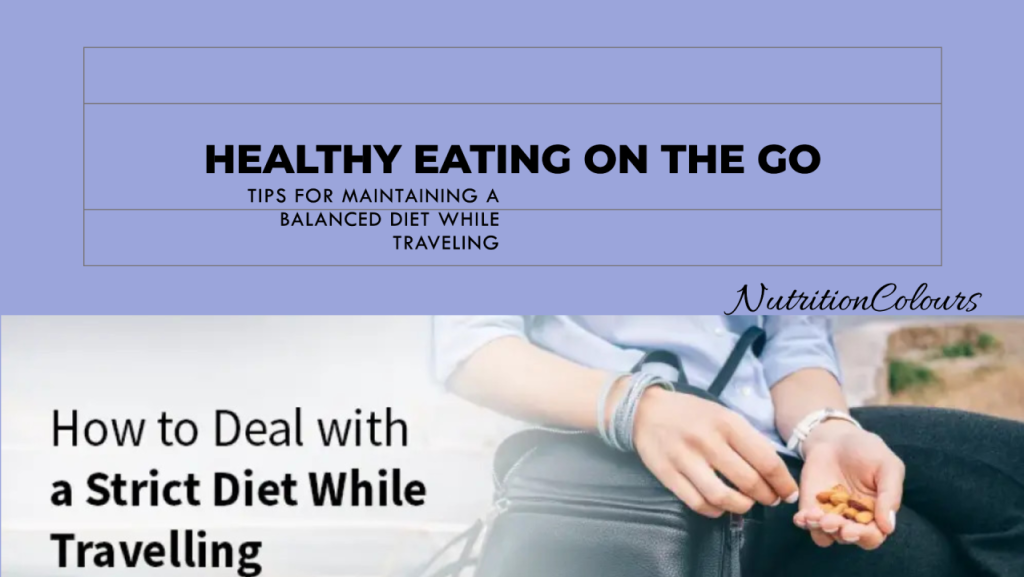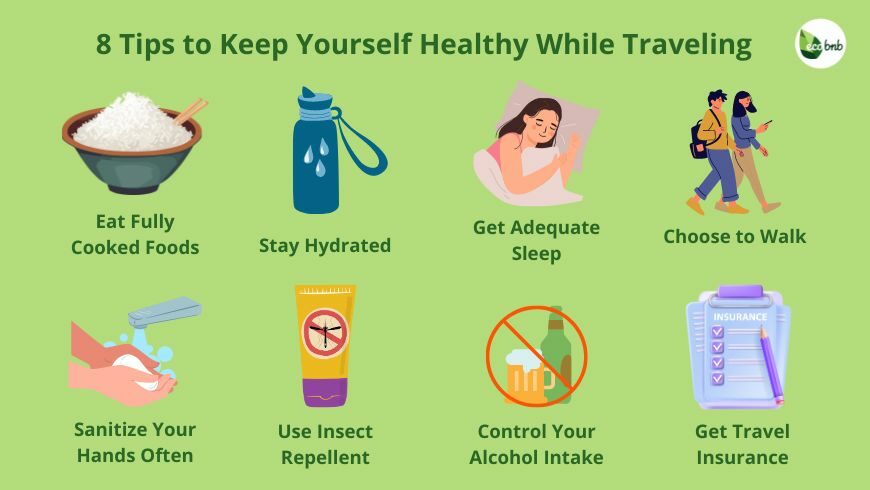How to Maintain a Healthy Lifestyle While Traveling: The Complete 2026 Guide
Traveling is an exciting opportunity to explore new cultures, cuisines, and destinations, but it can also disrupt your healthy routines. Between long flights, irregular schedules, unfamiliar foods, and the temptation to overindulge, it’s easy to let your health slip. However, maintaining a healthy lifestyle while traveling is entirely possible with proper planning, awareness, and simple habits. This guide will help you stay physically, mentally, and nutritionally balanced during your trips abroad.

1. Why Maintaining Health While Traveling Matters
Even short trips can impact your body and mind:
- Physical health risks: Jet lag, disrupted sleep, poor nutrition, and sedentary travel can weaken your immune system.
- Mental health challenges: Travel stress, culture shock, and fatigue can lead to anxiety or irritability.
- Long-term habits: Falling out of your regular routine may make it harder to resume healthy behaviors after your trip.
Maintaining health while traveling ensures:
- Higher energy levels for exploring and enjoying activities.
- Improved immune response to prevent illness.
- Enhanced mental clarity, mood, and overall travel experience.
2. Plan Ahead for a Healthy Trip
a. Research Local Options
- Look for accommodations with fitness facilities or nearby parks.
- Check for healthy food options at your destination, including restaurants, grocery stores, and markets.
- Research local health practices, vaccination requirements, or sanitation standards.
b. Pack Smart
- Include portable workout gear like resistance bands or a jump rope.
- Bring healthy snacks (nuts, dried fruit, protein bars) to avoid relying on fast food.
- Pack a water bottle, supplements, and basic first-aid supplies.
c. Set Goals
- Define your personal health goals for the trip: exercise frequency, sleep patterns, hydration targets, or nutritional intake.
- Keeping goals realistic ensures consistency without adding travel stress.
3. Nutrition Tips for Travelers
Eating healthy on the road can be challenging, but with awareness, it’s achievable.
a. Prioritize Balanced Meals
- Include protein, vegetables, fruits, and whole grains whenever possible.
- Avoid excessive fried or highly processed foods, especially in tourist-heavy areas.
- Sample local cuisine mindfully—moderation is key.
b. Hydration Is Crucial
- Air travel and changes in climate can cause dehydration.
- Carry a reusable water bottle and drink at least 8–10 glasses of water daily.
- Limit sugary drinks, alcohol, and excessive caffeine.
c. Smart Snacking
- Pack healthy snacks for long flights, bus rides, or hiking trips.
- Avoid relying on airport or convenience store junk food.
- Nuts, seeds, and fruits are travel-friendly options.
4. Exercise While Traveling
Staying active doesn’t require a gym membership.
a. Hotel or Apartment Workouts
- Use bodyweight exercises: squats, push-ups, lunges, and planks.
- Carry resistance bands or a jump rope for more variety.
b. Outdoor Activities
- Walk or bike instead of using taxis or rideshares.
- Explore destinations by hiking, swimming, or jogging through scenic areas.
- Participate in local classes such as yoga, martial arts, or dance.
c. Travel-Specific Tips
- For long flights: walk through the cabin every 2–3 hours and stretch regularly.
- Avoid sitting for extended periods—mobility is crucial for circulation.
5. Sleep and Recovery
Travel can disrupt your sleep routine, but maintaining quality rest is essential for health.
a. Manage Jet Lag
- Adjust your sleep schedule 2–3 days before departure if crossing time zones.
- Use AI-powered apps or light exposure strategies to sync with your destination’s time.
- Stay hydrated and avoid excessive alcohol on flights.
b. Sleep Hygiene on the Road
- Use earplugs, eye masks, or white noise apps to block unfamiliar sounds.
- Maintain a consistent bedtime as much as possible.
- Create a comfortable sleep environment—travel pillows and compact blankets help.

6. Mental Health While Traveling
Maintaining mental well-being is as important as physical health.
a. Practice Mindfulness
- Meditation, journaling, or breathing exercises reduce travel stress.
- Use apps like Headspace, Calm, or Insight Timer for guided sessions.
b. Stay Connected
- Regular communication with family or friends provides emotional support.
- Socializing with fellow travelers can reduce feelings of isolation.
c. Avoid Over-Scheduling
- Plan downtime to rest and enjoy spontaneous experiences.
- Avoid overloading your itinerary, which can cause fatigue and stress.
7. Healthy Travel Habits
Consistency is key, even while on the move.
a. Prioritize Hygiene
- Wash hands frequently and carry hand sanitizer.
- Keep travel items clean, especially in hostels or public transportation.
b. Avoid Excessive Alcohol
- Limit alcohol consumption to prevent dehydration, poor sleep, and weight gain.
- Opt for local non-alcoholic beverages, smoothies, or infused water.
c. Mindful Eating Practices
- Eat slowly and savor your meals to avoid overeating.
- Balance indulgent meals with lighter, nutritious options.
8. Travel-Friendly Healthy Eating Tips
a. Local Markets and Groceries
- Buy fresh fruits, vegetables, and lean proteins at local markets.
- Prepare simple meals in rental apartments or hostels.
b. Restaurant Strategies
- Choose grilled, steamed, or baked dishes instead of fried options.
- Ask for dressings or sauces on the side to control calorie intake.
- Share meals if portions are large to avoid overeating.
c. Supplements and Vitamins
- Bring daily supplements to support immunity and energy.
- Include probiotics or multivitamins if your diet will change significantly abroad.
9. Managing Stress and Staying Motivated
Travel can be unpredictable, but maintaining a positive mindset is part of a healthy lifestyle.
a. Stay Flexible
- Unexpected delays or changes can cause frustration—adaptability is key.
- Focus on what you can control: nutrition, hydration, exercise, and rest.
b. Set Small Daily Goals
- Incorporate mini-workouts, hydration targets, or mindful moments.
- Celebrate small achievements to maintain motivation.
c. Travel Journaling
- Document experiences, meals, workouts, and reflections.
- Helps monitor your health habits and mental well-being.

10. Healthy Lifestyle Tools and Apps for Travelers
Several tools can help maintain routines abroad:
- MyFitnessPal: Track nutrition and caloric intake.
- FitOn or Nike Training Club: Follow guided workouts without equipment.
- Sleep Cycle: Monitor and optimize sleep patterns.
- Headspace or Calm: Meditation and mindfulness support.
- Water Reminder Apps: Ensure proper hydration throughout the day.
11. Travel-Specific Healthy Tips for 2026
With evolving travel trends, these tips are particularly relevant:
- AI-powered itinerary planning: Suggests exercise breaks and healthy food options.
- Wearable fitness devices: Track steps, heart rate, sleep, and activity levels.
- Contactless meal prep and delivery apps: Health-conscious options for remote stays.
- Sustainable travel options: Walking tours, cycling, and eco-friendly transportation align with a healthy and responsible lifestyle.
12. Final Thoughts
Maintaining a healthy lifestyle while traveling may seem challenging, but with planning, awareness, and consistency, it’s entirely achievable. Healthy habits—balanced nutrition, regular exercise, sufficient sleep, and mental well-being—enhance your travel experience, allowing you to explore destinations with energy, focus, and enjoyment.
Travel is not just about visiting new places; it’s about taking care of your body and mind so you can fully enjoy every moment. By implementing these strategies, you can stay fit, energized, and happy while discovering the world.